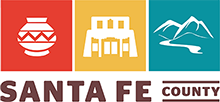News and Articles
12/01/2008
Fire Department Concerned About Recent Fire Related Deaths & Elderly
Following the recent tragic, fire-related deaths of two elderly residents in northern Santa Fe County the Santa Fe County Fire Department is urging residents take immediate action. The department is providing the following information in an attempt to educate residents in hopes of making homes safer when using alternative heating sources. The department is extremely concerned with how these alternative heating sources are being used, especially in the homes of the elderly and those with children.
A recent Red Cross/NFPA survey shows that most Americans are concerned about home heating costs and many will use alternative heating sources this winter to heat their homes. Home heating equipment is a leading cause of home fires during the months of December, January and February.
Knowing what to do in the event of a fire is particularly important for older adults. At age 65, people are twice as likely to be killed or injured by fires compared to the population at large. As the number of elderly adults age 65 and older continues to grow and currently make up about 12 percent of the population - it's essential to take the necessary steps to stay safe.
The Fire Department offers the following information for older and elderly adults:
(1) Install smoke alarms. At a minimum make sure smoke alarms are installed in every sleeping room. If possible, have a telephone installed where you sleep in case of an emergency. The majority of fatal fires occur when people are sleeping and because smoke can put you into a deeper sleep rather than waking you it’s important to have a smoke alarm that can wake you. If anyone in the home is deaf or their hearing is diminished consider installing a smoke alarm that uses a flashing light in addition to an audible alarm.
(2) Be fire safe. Keep flammable materials away from heating sources such as wood stoves or portable heaters.
(3) Keep exits open. Make sure that all doors and windows are operable and can be opened during an emergency. Security bars on doors or windows should have an emergency release device in the event of a fire. Make sure windows and doors are not blocked or worse, nailed shut. The elderly, especially those with impairments, need clear paths to get out of their homes during a fire.
Facts & figures
- In 2005, heating equipment was involved in an estimated 62,200 reported U.S. home structure fires, with associated losses of 670 civilian deaths, 1,550 civilian injuries, and $909 million in direct property damage.
- In 2005 heating equipment fires accounted for 16% of all reported home fires (second behind cooking) and 22% of home fire deaths. Space heaters, whether portable or stationary, accounted for one-third (32%) of the home heating fires and three-fourths (73%) of home heating fire deaths in 2005.
- Excluding small confined fires, heating equipment too close to things that can burn, such as upholstered furniture, clothing, mattress, or bedding, is by far the leading factor contributing to home heating fires (27%) and home heating fire deaths. Keep anything that can burn at least three feet away from heating equipment, such as the furnace, fireplace, wood stove, or portable heater.
- Only use heating equipment that has the label of a recognized testing laboratory.
- Never use your oven for heating.
- Have a qualified professional install stationary space heating equipment, water heaters or central heating equipment according to the local codes and manufacturer’s instructions.
- Maintain heating equipment and chimneys by having them cleaned and inspected annually by a qualified professional.
- Turn portable heaters off when leaving the room or going to bed.
- For fuel burning space heaters, always use the proper fuel as specified by the manufacturer
- Make sure the fireplace has a sturdy screen to prevent sparks from flying into the room and burn only dry, seasoned wood. Allow ashes to cool before disposing in a metal container, which is kept a safe distance from the home.
- For wood burning stoves, install chimney connectors and chimneys following manufacturer’s instructions or have a professional do the installation.
- Make sure all fuel-burning equipment is vented to the outside to avoid carbon monoxide poisoning.
- In addition to a smoke alarm, install and maintain carbon monoxide (CO) alarms to avoid the risk of CO poisoning.
- If you smell gas in your gas heater, do not attempt to light the appliance. Turn off all the controls and open doors and windows. Call the fire department and your local gas utility company.
- Test smoke alarms at least monthly during the months of November, December and January.
ADDITIONAL FIRE PREVENTION TIPS FOR SENIORS
For more information
Contact: John Wheeler, Asst. Chief, PIO
Phone: 505-992-3070
E-mail: john.wheeler1@state.nm.us
